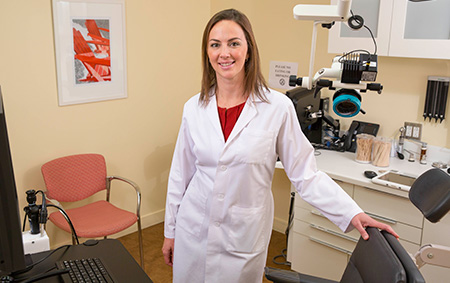Sleep Apnea Management
Surgical intervention may be necessary for patients with obstructive sleep apnea in whom nonsurgical approaches, such as continuous positive airway pressure (CPAP), are not sufficiently effective or well tolerated, or in patients who are not adherent to the prescribed therapy. Uncontrolled sleep apnea may place patients at risk of cardiovascular issues and cognitive impairment, accidents, and diminished quality of life.
At NewYork-Presbyterian, our otolaryngologists work closely with other sleep specialists to help patients achieve restorative sleep — not only benefiting them, but their partners as well. Some patients benefit from surgical approaches such as uvulopalatopharyngoplasty, genioglossus advancement, maxillomandibular advancement, or hyoid suspension.

NewYork-Presbyterian/Weill Cornell
Maria V. Suurna, MD, sleep management expert
For patients whose snoring remains or who cannot tolerate these procedures, we offer upper airway stimulation for those with appropriate anatomy using an implantable hypoglossal nerve stimulator. This nerve stimulation stabilizes the airway during sleep, preventing the tongue from sliding back and improving airflow.
-
The most experience. NewYork-Presbyterian/Weill Cornell was the first center in the New York area approved to offer this game-changing therapy and has more experience than any other regional center using this treatment in patients with moderate to several sleep apnea. We are now one of the few centers recognized as a Center of Excellence for building and maintaining this program.
-
Patient controlled. The device is implanted under the skin in the upper chest. The patient turns it on each night and turns it off each morning using a handheld remote. Studies have shown that patients are highly compliant with the device.
-
Proven efficacy. Hypoglossal nerve stimulation has been shown to lower the apnea-hypopnea index (number of events per hour) by 82%, reduce daytime sleepiness, and increase oxygen saturation. Patients have also reported improvements in heart health, a reduction in motor vehicle accidents, improved job performance, and better quality of life for their partners as well. Our researchers showed that some patients in whom hypoglossal nerve stimulation isn't sufficient may benefit from the addition of uvulopalatopharyngoplasty and tonsillectomy.
-
Monitoring compliance. NewYork-Presbyterian/Weill Cornell is now the first center in the country to start using cloud technology to monitor patient compliance with therapy and outcomes.
Publication
-
Upper-airway stimulation before, after, or without uvulopalatopharyngoplasty: A two-year perspective. The Laryngoscope. 2019;129:514-18.



